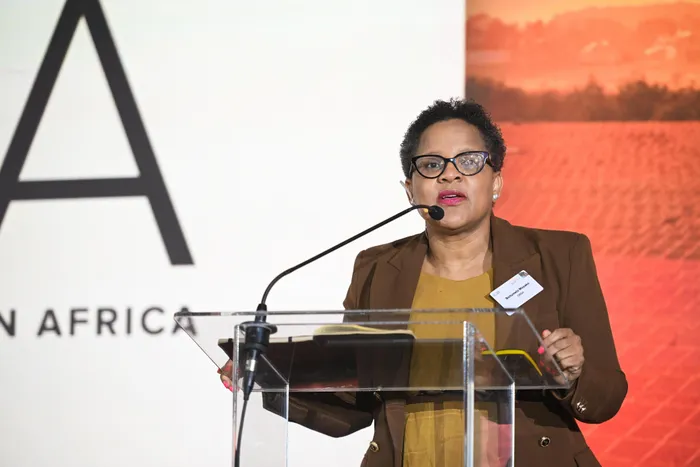DBSA delivers record R5.3bn profit despite weak economy

DBSA CEO Boitumelo Mosako said Wednesday that the bank has again delivered strong financial results.
Image: Supplied
The Development Bank of Southern Africa’s profitability soared in the year ended March 31, 2025 after net interest income grew and non-performing loans decreased despite “unsatisfactory” local and regional economic growth rates, unfavourable interest rates and geopolitical risk factors.
Net interest income for DBSA for the year firmed up by 8.6% to R8.4 billion while operating income increased 12.3% stronger at R8.8bn. Net profits for the year resultantly grew 14.4% to R5.3bn, a record for the financier, attributable to “a solid increase in net interest income and positive fair value” adjustments.
This was partially offset by currency losses reported following the rand’s appreciation against the US dollar. DBSA CEO Boitumelo Mosako said Wednesday that the “bank has again delivered strong financial results while advancing the developmental mandate with tangible” impacts.
“The DBSA is accelerating its growth and impact through a ten year strategy which focuses on capacity enhancing governance, introducing innovative products to unlock trade and investment. We do not get funded from taxpayers' money, so we need to make sure that we make the money to be able to re to deploy,” said Mosako during a presentation of the company’s financials.
She, however, expects headwinds to persist, with the global geopolitical landscape likely to remain highly dynamic with persistent rivalries, conflicts, and economic uncertainty. This was unfavourable as it will shape up trade, investment, and development flows and dynamics regionally and domestically.
“These challenges demand a strategic and adaptative approach. The DBSA will continue to safeguard its operations, both resilience, and leverage opportunities as intra African trade and regional partnerships used to de risk projects and drive, sustainable development across southern Africa and the continent,” added Mosako.
During the period under review, DBSA’s total development loans and development bonds marginally decreased by 0.5% to R114.6bn while total disbursements including loans and equities increased by 2.9% to R17.5bn.
Its gross non performing loans ratio decreased to 3.2% compared to 3.9% a year earlier. Impairment losses for the year to March however marginally increased to R1.5bn while the total asset base increased by 2.3% to R121bn as at the end of March, mainly due to a 39% rise cash and cash equivalents to R15bn.
Appreciation in the rand resulted in the gross loan book net reduction of R860 million, with development loan disbursements decreasing to R16.3bn. DBSA said South Africa’s economic growth rate remains unsatisfactory, with risk factors including long standing structural constraints such as the port and railway challenges that created bottlenecks and curbed mineral exports.
It also cited “weak state capacity to implement policies negatively impacting business and financial sentiment. In addition, challenges associated with the US-South Africa relations and early-stage challenges around the Government of National Unity” as threatening to further constrain economic growth.
DBSA chief financial officer Zodwa Mbele explained that the economic growth of South Africa has been very sluggish for the longest time and added that this was not not giving the lender “enough opportunities to lend or to provide more intervention” through financing development projects.
Among the top sectors DBSA was funding is the energy sector which Mbele described as “ very matured, both in South Africa and other countries,” thereby presenting “many opportunities to invest” in the sector.
Municipalities were also another top area for funding for DBSA although the bank was only partnering South African municipalities that are geared to deliver an improvement in service delivery.
“Municipal credit risk remains elevated, as municipalities continue to face significant financial distress, with issues such as financial mismanagement, poor service delivery, and budgetary constraints remaining prevalent. These challenges call for businesses to re-assess business strategies and evaluate their strategic, operational and financial vulnerabilities,” explained Mbele.
It is not just South Africa that is suffering from headwinds. Mbele said its markets elsewhere in Africa have also been affected by sluggish economic growth.
BUSINESS REPORT